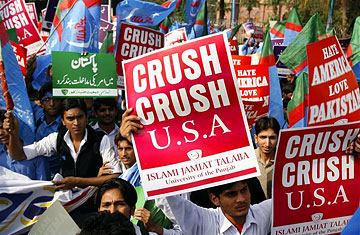
Supporters of Islami Jamiat Talaba, a student wing of political Islamic party Jamaat-e-Islami, hold up anti-American placards during a rally in Lahore on Nov. 17, 2009
In this land of conspiracy theories, roiling suspicions and rumors have long been rife that the U.S., while publicly pledging confidence in Pakistan's ability to keep its much-prized nuclear arsenal out of the hands of al-Qaeda sympathizers, secretly plans to seize the Islamic A-bombs. The latest WikiLeaks document dump will do little to change that prevailing view.
In the wake of WikiLeaks' disclosure on Sunday of some quarter-million U.S. diplomatic cables, Pakistan's oft-sensationalist television talk shows latched on to a May 2009 dispatch purportedly revealing a classified American effort dating back to 2007 to secretly move highly enriched uranium out of a Pakistani research reactor. The contents of the cable were first reported by the New York Times and other media outlets that were given advanced access to the diplomatic deluge.
Some in Pakistan have dismissed the disclosure as old news. "It only confirms that Pakistan's nuclear assets can only be safeguarded by Pakistan," former Pakistani ambassador to the U.S Tariq Fatemi told the English-language Express 24/7 news channel on Monday. "So while it's not going to help the cause of America in Pakistan, and the anti-Americanism, there is really nothing new that has not been known to many people in the know."
According to the cable, then U.S. Ambassador Anne Patterson reportedly said that Pakistani officials were denying American requests to visit the unnamed facility, citing the concerns of an anonymous Pakistani official that if the local media caught wind of the story, "they certainly would portray it as the United States taking Pakistan's nuclear weapons."
By Monday morning, much of Pakistan's print media had done just that. Reactions to the Sunday-night WikiLeaks revelations were perhaps too late to make it onto the opinion pages, but front-page headlines screamed the news. "U.S. Trying to Remove Enriched Pak Uranium: WikiLeaks," read the relatively moderate Dawn newspaper, an English daily. The best-selling News International took it one step further: "U.S. Failed in Removing Enriched Uranium from Pak Facility: Report."
It's no secret that the U.S. has long had deep misgivings that Islamic extremists in insurgency-riven Pakistan could steal nuclear material to make a weapon. A November 2009 New Yorker article by veteran investigative journalist Seymour Hersh said there were ongoing consultations on nuclear security between the two capitals and that the U.S. wanted specially trained units to be called in to help secure the Pakistani arsenal in case of trouble. The allies have a decades-long history of distrust, harking back to the days of the Afghan jihad against Soviet occupation.
In addition to the nuclear bombshell, the documents revealed other embarrassing tidbits. In one cable, Saudi Arabia's King Abdullah, a close ally of Pakistan, reportedly called embattled and deeply unpopular Pakistani President Asif Ali Zardari the main cause of his country's woes. "When the head is rotten," the document quoted him as saying, "it affects the whole body." The President's office responded on Monday that the leaks were "no more than an attempt to create misperceptions between two important and brotherly Muslim countries," Reuters quoted spokesman Farhatullah Babar as saying.
Islamabad's Foreign Ministry, which called WikiLeaks "irresponsible," said on Monday that the U.S. had warned it in advance about the release of the sensitive documents and that it was still examining them. Interior Minister Rehman Malik refused to comment on any of the allegations. "I do not go by whatever is in the media," Malik told reporters in the Pakistani capital. "I will give my point of view only once I've seen the documents."
The U.S. embassy, meanwhile, was in damage-control mode. The new ambassador, Cameron Munter, had already penned an opinion piece that was published in both the Urdu- and English-language press in which he lambasted the WikiLeaks deluge. "I cannot vouch for the authenticity of any one of these documents," the ambassador wrote. "But I can say that the United States deeply regrets the disclosure of any information that was intended to be confidential," he added. "Diplomats must engage in frank discussions with their colleagues, and they must be assured that these discussions will remain private ... I'm sure that Pakistan's ambassadors to the United States would say the same thing." Perhaps, but the Pakistani street largely views the revelations as confirmation of their long-held beliefs.
